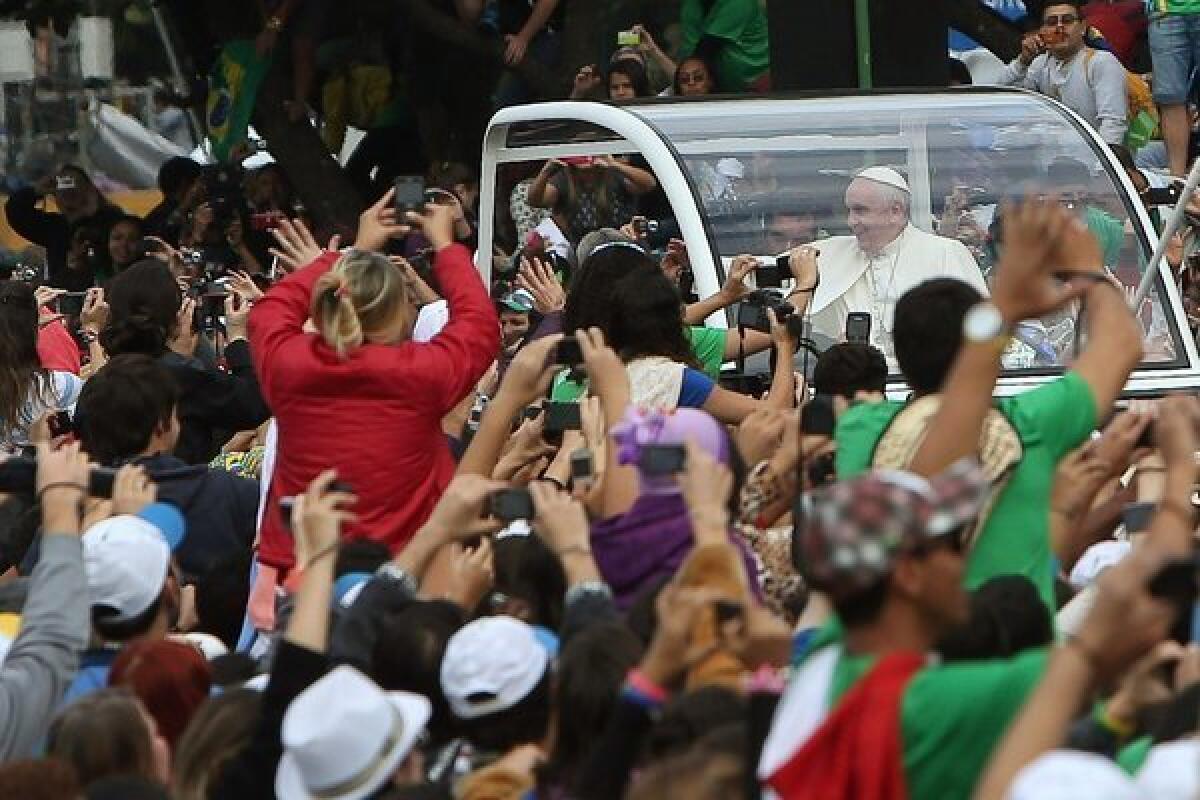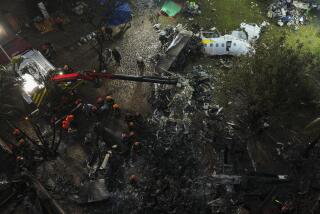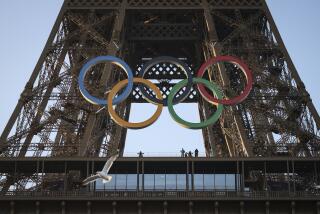Can Brazil fix mistakes from Pope Francis visit in time for World Cup?

RIO DE JANEIRO — There was a last-minute change of venue that cost millions. A security scare that left a prized visitor stranded and exposed. Neighbors paralyzed by intermittent transportation breakdowns.
Brazil has less than a year to ensure that the organizational breakdowns that marked the visit of Pope Francis to Rio de Janeiro last week won’t be repeated at soccer’s 2014 World Cup. Along with the Olympic Summer Games two years later, the sporting events may go a long way to define Brazil’s global reputation and political future.
Authorities are scrambling to fix the mistakes, and insist that things will be different next time.
Mayor Eduardo Paes said Rio’s performance during the pope’s visit was “closer to zero than 10,” and is urging more centralization for these types of mega-events that would bring security, transportation and businesses into closer cooperation.
But he also stressed that the Catholic Church’s World Youth Day, which brought an estimated 3 million people onto Copacabana beach Sunday after a week of activities, was an especially large and complicated event, a claim echoed by Gilberto Carvalho, a senior aide to President Dilma Rousseff.
“None of those events will be as big as this one, neither the World Cup nor the Olympics,” Carvalho said.
While no single World Cup match may be more complicated than the papal visit, the sporting event will present different challenges: Teams and fans will have to move around the massive country on badly stretched infrastructure.
The country spent at least $48 million on the pope’s visit, while protesters continue to decry the poor state of public services such as schools and hospitals. Paes is trying to find a use for a piece of land that was meant to be used for the pope’s final Mass. At least $2.7 million was spent on preparations, but it was deemed unsuitable just days before the service.
Brazil’s success in winning the right to the 2014 World Cup, which will take place at venues around the country, and the 2016 Olympics, which Rio will host, was widely regarded as recognition of the country’s growth and emergence onto the world stage.
But pulling off the events successfully has taken on special significance. An economic slowdown has taken the shine off its reputation for booming economic growth, and a wave of protests that spread across the country in June raised questions about its stability.
The government’s performance during the World Cup will be one of the major issues in the campaign for presidential elections next fall, said Tony Volpon, economist in charge of Americas research at Nomura in New York.
“You can’t draw direct comparisons between the pope’s visit and the World Cup, but what we saw last week is that Rio still doesn’t really know how to manage these huge events,” Volpon said. “Hopefully, it provides a learning experience for the government.”
The lessons began soon after the Argentine-born pontiff landed. On the way to the city, his car took an unexpected turn, leaving him stuck in traffic and surrounded by excited crowds. While the incident helped bolster his image as a man of the people, security experts said Francis was at serious risk. The next day, the city’s already-strained metro system lost power for hours, leaving commuters stranded.
The government promised that the impending sporting events would mean better infrastructure. Brazil’s boom years saw a huge increase in demand for cars and air travel, but crucial improvements in roads, airports, and public transportation have not materialized. High bus fares for poor service originally set off the first round of protests this year.
Transportation problems are especially worrisome for the World Cup, as teams and fans will have to move quickly among many host cities.
Last week, when heavy rains turned the intended site of the pope’s final Mass to mud, the venue was changed to Copacabana, and the neighborhood was overwhelmed by the pilgrims, who camped out on the beach the night before.
“I am Italian -- I am used to a little bit of chaos,” said a smiling Giocomo Lovisoni, 21, who was visiting from Gorizia, Italy. “When there were Metro problems, no problem. We just walked to Copacabana singing and playing guitar,” he said, referring to the four-mile, 90-minute hike from his hotel.
One risk is that hordes of soccer fans, perhaps intoxicated with something other than the Lord, may be less forgiving. But the greater risk, analysts say, is that cost overruns will provide more fuel for the kinds of protests that contrast big public spending with dire services, which could overshadow the World Cup.
This kind of imagery was picked up by the Sun-Times in Chicago, which also sought to host the 2016 Olympics. The paper ran a photo of Rio protesters in front of street fires under the headline, “We lost to this?”
Mayor Paes was not amused.
“Chicago is dying of envy,” he said on local radio, criticizing crime and race relations in Chicago while acknowledging that Rio needed to solve some serious problems of its own. “[Chicago] lost to Brazil because Brazil is looking forward.”
ALSO:
African observers criticize Zimbabwe’s election, won’t reject results
Iran’s new leader causes furor with remarks about Israeli occupation
U.S. issues global travel alert, closes embassies over Al Qaeda threat
More to Read
Sign up for Essential California
The most important California stories and recommendations in your inbox every morning.
You may occasionally receive promotional content from the Los Angeles Times.










